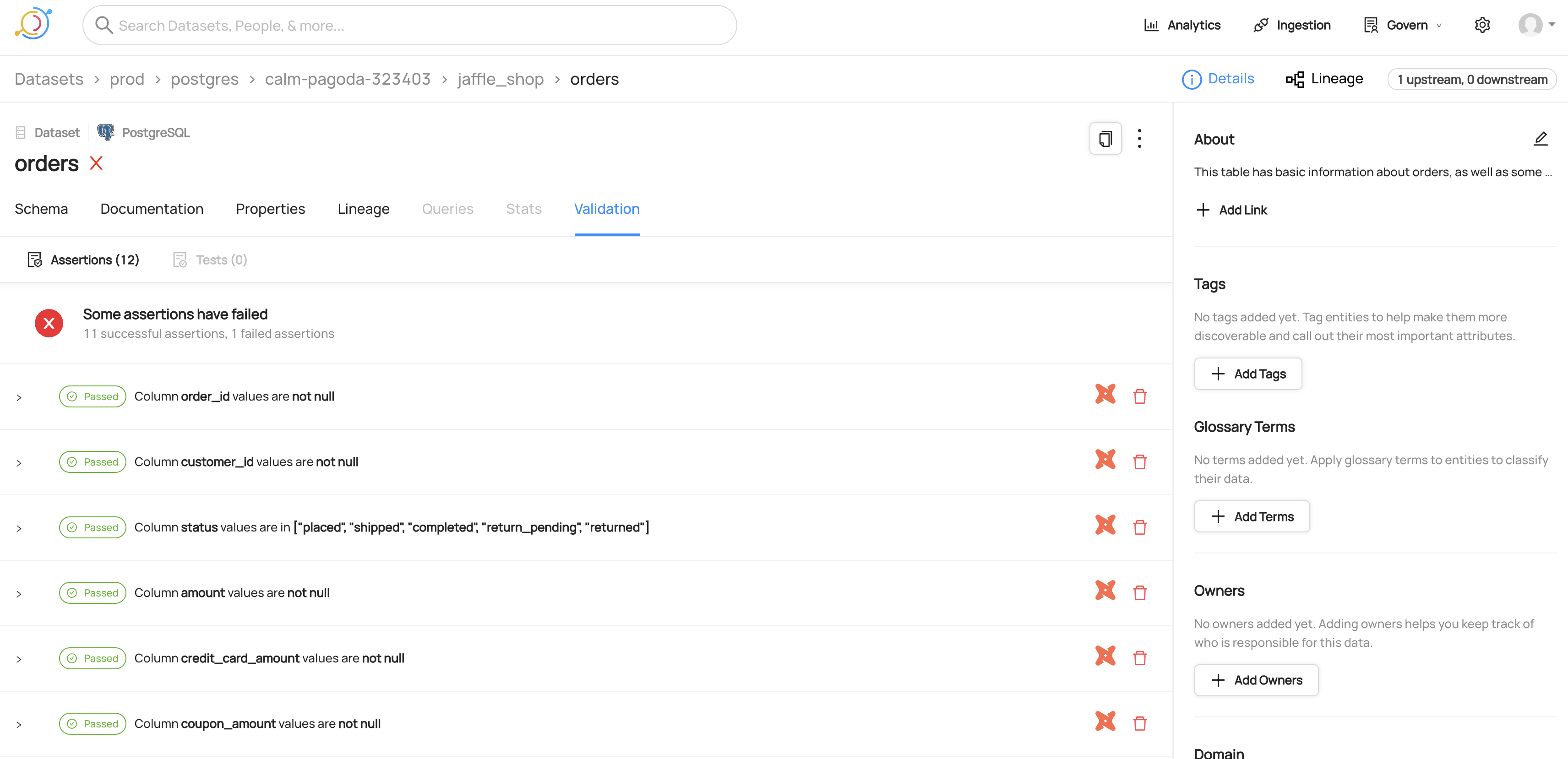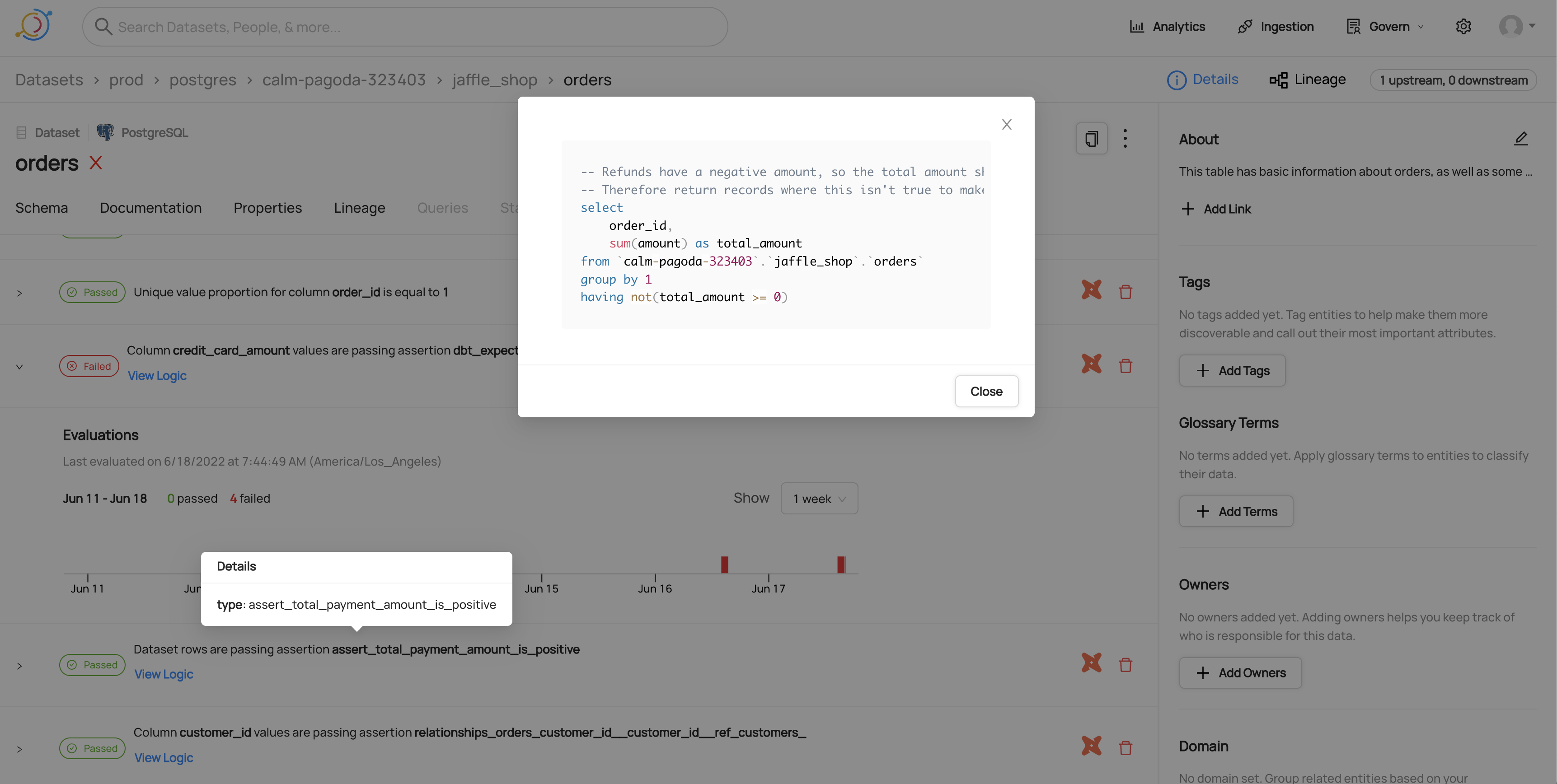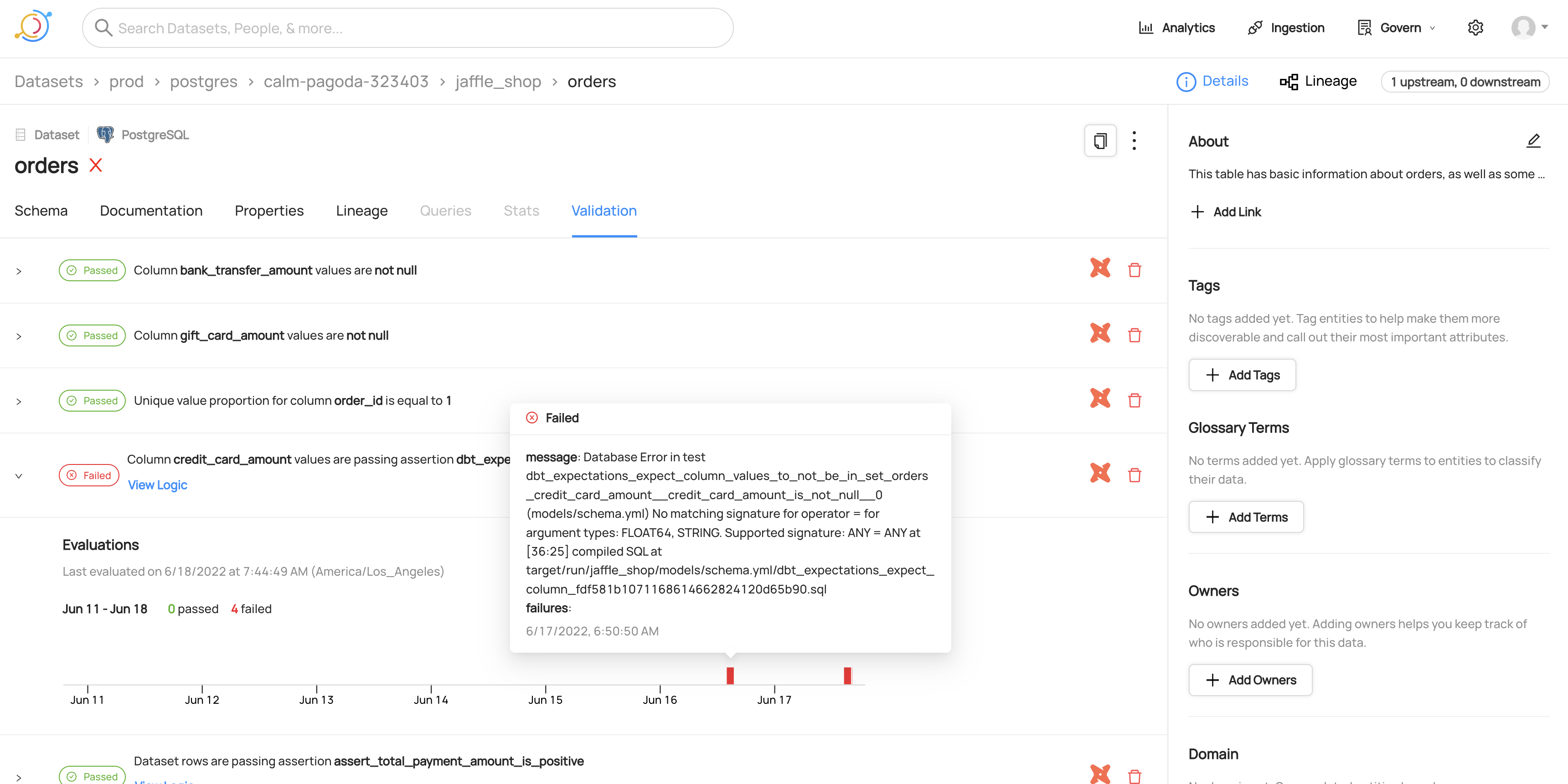mirror of
https://github.com/datahub-project/datahub.git
synced 2025-09-15 12:12:07 +00:00
184 lines
7.1 KiB
Markdown
184 lines
7.1 KiB
Markdown
### dbt meta automated mappings
|
|
dbt allows authors to define meta properties for datasets. Checkout this link to know more - [dbt meta](https://docs.getdbt.com/reference/resource-configs/meta). Our dbt source allows users to define
|
|
actions such as add a tag, term or owner. For example if a dbt model has a meta config ```"has_pii": True```, we can define an action
|
|
that evaluates if the property is set to true and add, lets say, a ```pii``` tag.
|
|
To leverage this feature we require users to define mappings as part of the recipe. The following section describes how you can build these mappings. Listed below is a meta_mapping section that among other things, looks for keys like `business_owner` and adds owners that are listed there.
|
|
|
|
<Tabs>
|
|
<TabItem value="yaml" label="YAML" default>
|
|
|
|
```yaml
|
|
meta_mapping:
|
|
business_owner:
|
|
match: ".*"
|
|
operation: "add_owner"
|
|
config:
|
|
owner_type: user
|
|
owner_category: BUSINESS_OWNER
|
|
has_pii:
|
|
match: True
|
|
operation: "add_tag"
|
|
config:
|
|
tag: "has_pii_test"
|
|
int_property:
|
|
match: 1
|
|
operation: "add_tag"
|
|
config:
|
|
tag: "int_meta_property"
|
|
double_property:
|
|
match: 2.5
|
|
operation: "add_term"
|
|
config:
|
|
term: "double_meta_property"
|
|
data_governance.team_owner:
|
|
match: "Finance"
|
|
operation: "add_term"
|
|
config:
|
|
term: "Finance_test"
|
|
```
|
|
</TabItem>
|
|
<TabItem value="json" label="JSON">
|
|
|
|
```json
|
|
"meta_mapping": {
|
|
"business_owner": {
|
|
"match": ".*",
|
|
"operation": "add_owner",
|
|
"config": {"owner_type": "user", "owner_category": "BUSINESS_OWNER"},
|
|
},
|
|
"has_pii": {
|
|
"match": True,
|
|
"operation": "add_tag",
|
|
"config": {"tag": "has_pii_test"},
|
|
},
|
|
"int_property": {
|
|
"match": 1,
|
|
"operation": "add_tag",
|
|
"config": {"tag": "int_meta_property"},
|
|
},
|
|
"double_property": {
|
|
"match": 2.5,
|
|
"operation": "add_term",
|
|
"config": {"term": "double_meta_property"},
|
|
},
|
|
"data_governance.team_owner": {
|
|
"match": "Finance",
|
|
"operation": "add_term",
|
|
"config": {"term": "Finance_test"},
|
|
},
|
|
}
|
|
```
|
|
</TabItem>
|
|
</Tabs>
|
|
|
|
We support the following operations:
|
|
1. add_tag - Requires ```tag``` property in config.
|
|
2. add_term - Requires ```term``` property in config.
|
|
3. add_owner - Requires ```owner_type``` property in config which can be either user or group. Optionally accepts the ```owner_category``` config property which you can set to one of ```['TECHNICAL_OWNER', 'BUSINESS_OWNER', 'DATA_STEWARD', 'DATAOWNER'``` (defaults to `DATAOWNER`).
|
|
|
|
Note:
|
|
1. Currently, dbt meta mapping is only supported for meta elements defined at the model level (not supported for columns).
|
|
2. For string meta properties we support regex matching.
|
|
|
|
With regex matching, you can also use the matched value to customize how you populate the tag, term or owner fields. Here are a few advanced examples:
|
|
|
|
#### Data Tier - Bronze, Silver, Gold
|
|
|
|
If your meta section looks like this:
|
|
```yaml
|
|
meta:
|
|
data_tier: Bronze # chosen from [Bronze,Gold,Silver]
|
|
```
|
|
and you wanted to attach a glossary term like `urn:li:glossaryTerm:Bronze` for all the models that have this value in the meta section attached to them, the following meta_mapping section would achieve that outcome:
|
|
```yaml
|
|
meta_mapping:
|
|
data_tier:
|
|
match: "Bronze|Silver|Gold"
|
|
operation: "add_term"
|
|
config:
|
|
term: "{{ $match }}"
|
|
```
|
|
to match any data_tier of Bronze, Silver or Gold and maps it to a glossary term with the same name.
|
|
|
|
#### Case Numbers - create tags
|
|
If your meta section looks like this:
|
|
```yaml
|
|
meta:
|
|
case: PLT-4678 # internal Case Number
|
|
```
|
|
and you want to generate tags that look like `case_4678` from this, you can use the following meta_mapping section:
|
|
```yaml
|
|
meta_mapping:
|
|
case:
|
|
match: "PLT-(.*)"
|
|
operation: "add_tag"
|
|
config:
|
|
tag: "case_{{ $match }}"
|
|
```
|
|
|
|
#### Stripping out leading @ sign
|
|
|
|
You can also match specific groups within the value to extract subsets of the matched value. e.g. if you have a meta section that looks like this:
|
|
```yaml
|
|
meta:
|
|
owner: "@finance-team"
|
|
business_owner: "@janet"
|
|
```
|
|
and you want to mark the finance-team as a group that owns the dataset (skipping the leading @ sign), while marking janet as an individual user (again, skipping the leading @ sign) that owns the dataset, you can use the following meta-mapping section.
|
|
```yaml
|
|
meta_mapping:
|
|
owner:
|
|
match: "^@(.*)"
|
|
operation: "add_owner"
|
|
config:
|
|
owner_type: group
|
|
business_owner:
|
|
match: "^@(?P<owner>(.*))"
|
|
operation: "add_owner"
|
|
config:
|
|
owner_type: user
|
|
owner_category: BUSINESS_OWNER
|
|
```
|
|
In the examples above, we show two ways of writing the matching regexes. In the first one, `^@(.*)` the first matching group (a.k.a. match.group(1)) is automatically inferred. In the second example, `^@(?P<owner>(.*))`, we use a named matching group (called owner, since we are matching an owner) to capture the string we want to provide to the ownership urn.
|
|
|
|
|
|
### dbt query_tag automated mappings
|
|
This works similarly as the dbt meta mapping but for the query tags
|
|
|
|
We support the below actions -
|
|
1. add_tag - Requires ```tag``` property in config.
|
|
|
|
The below example set as global tag the query tag `tag` key's value.
|
|
```json
|
|
"query_tag_mapping":
|
|
{
|
|
"tag":
|
|
"match": ".*"
|
|
"operation": "add_tag"
|
|
"config":
|
|
"tag": "{{ $match }}"
|
|
}
|
|
```
|
|
|
|
### Integrating with dbt test
|
|
|
|
To integrate with dbt tests, the `dbt` source needs access to the `run_results.json` file generated after a `dbt test` execution. Typically, this is written to the `target` directory. A common pattern you can follow is:
|
|
1. Run `dbt docs generate` and upload `manifest.json` and `catalog.json` to a location accessible to the `dbt` source (e.g. s3 or local file system)
|
|
2. Run `dbt test` and upload `run_results.json` to a location accessible to the `dbt` source (e.g. s3 or local file system)
|
|
3. Run `datahub ingest -c dbt_recipe.dhub.yaml` with the following config parameters specified
|
|
* test_results_path: pointing to the run_results.json file that you just created
|
|
|
|
The connector will produce the following things:
|
|
- Assertion definitions that are attached to the dataset (or datasets)
|
|
- Results from running the tests attached to the timeline of the dataset
|
|
|
|
#### View of dbt tests for a dataset
|
|

|
|
#### Viewing the SQL for a dbt test
|
|

|
|
#### Viewing timeline for a failed dbt test
|
|

|
|
|
|
|
|
|